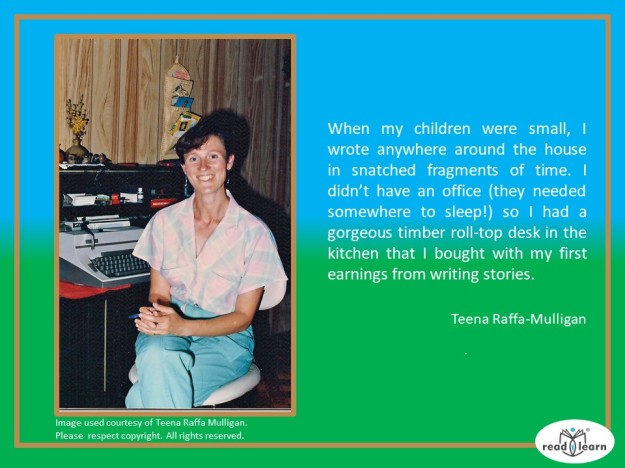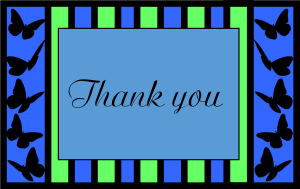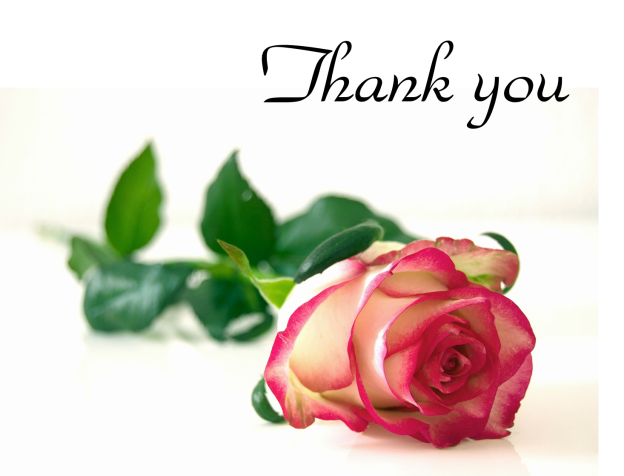Today, it is with great pleasure that I introduce you to Teena Raffa-Mulligan, author of a fun story for young readers The Apostrophe Posse.
This interview is part of Romi Sharp’s Books On Tour PR & Marketing and just one of several celebrating the launch of Teena’s book. Please read to the end of the post for details of other posts celebrating Teena’s work.
Note: Mostly, I publish these interviews first on readilearn but, until the readilearn blog schedule is resumed, I am sharing them here first.
About Teena Raffa-Mulligan

Teena Raffa-Mulligan is a reader, writer and daydream believer who believes there is magic in every day if you choose to find it. She discovered the wonderful world of storytelling as a child and decided to become a writer at an early age. Teena’s publications for children include poetry, short stories, picture books and chapter books. Her writing life has also included a long career in journalism. She shares her passion for books and writing by presenting talks and workshops to encourage people of all ages to write their own stories.
About The Apostrophe Posse
Trouble comes to Tea Tree Bend…
In cowboy movies the sheriff forms a posse to round up all the bad guys. Cam and Ellie from Daisy Cottage and their friends Billy and Louisa have formed a different posse. Their mission is to find and fix all the signs in Tea Tree Bend with missing apostrophes. The summer holidays are almost over so they have just nine days to complete their task.
How can doing the right thing go so wrong?
My thoughts
I couldn’t resist reading a book with the title The Apostrophe Posse. Many writers, children and adults alike, have difficulty with apostrophes and I could just imagine a posse going out after all the missing or misused apostrophes. I see so much of it myself and would love to round up all those apostrophes and put them where they should be.
I also found the consonance and assonance in the title appealing. It hinted that the book would be fun, and it is.
The book would be a great stimulus to discussions about the placement of apostrophes, but it’s too good a read to be limited to that alone.
Let’s find out what Teena has to say.
The interview.
Hi, Teena. Welcome to my blog.
Thanks for inviting me.
Teena, when did you know you wanted to be a writer?
I grew up in an English/Italian family, surrounded by natural story tellers whose tales about their lives captured my imagination. Once I learnt to read, books opened a wonderful window into the world of make believe and I knew from a very early age that I wanted to become a writer. I also wanted to be a ballerina, so I thought I’d write novels in the dressing room between performances while travelling the world. Reality woke me from the dancing dream, but I didn’t give up on the ambition to become an author and began submitting short adult fiction and poetry to publishers in my late teens. When I became a mum at the age of 21 and began sharing books with my small son, I realised I wanted to write for children.
Where do you write? Do you like to be by yourself in the quiet, or do you like to write in a noisy space?

I write in the lounge room in my recliner chair near the front window, in bed, at the kitchen bench, on the back patio, out on the deck overlooking the back garden, and I also have the luxury of my own office at home. When my children were small, I wrote anywhere around the house in snatched fragments of time. I didn’t have an office (they needed somewhere to sleep!) so I had a gorgeous timber roll-top desk in the kitchen that I bought with my first earnings from writing stories. It wasn’t quiet or peaceful with the business of the household going on around me and that didn’t seem to matter then. Those days are long gone, and I have become accustomed to my peace and quiet. I don’t even play music while I’m writing.
What do you use to write – pencil and paper or computer?

I like to get started with pen/pencil and paper… a few paragraphs, some dialogue, a scene or two. Being confronted by a blank computer screen sends my words into hiding. They don’t come out to play until they have some friends to join. Once I have something to work with, I prefer to stick with the computer. I write, revise, edit and proof on screen.
When do you write?
Not often enough! I spend hours every day on writing related activities but not necessarily on progressing my current WIP. I’m volunteer coordinator of the local writing centre so that keeps me busy. I also visit schools, libraries and community groups to present author talks and writing sessions whenever I get the opportunity. I recently ventured into indie publishing, releasing some of my own books and also my late father’s collection of spiritual writing. Then there’s social media to keep up with, plus reading blogs and watching videos to develop new writing and publishing skills. My new writing happens around all of that. I do set myself deadlines each week but they’re rather elastic.
When do you get your ideas?
They can come anytime and anywhere. The best ideas often arrive unexpectedly in the middle of the night, especially in winter when the last thing I want to do is leave my cosy, warm bed. I’ve learnt to keep notebooks handy after losing some wonderful stories because I thought I’d remember them in the morning. Once I have an initial idea, I don’t plan my stories. I start writing and see where they take me. This means I often don’t know what happens next. Walking, driving and washing dishes are great times for figuring that out.
Do you think of the story in your head before you write it?
Always. I compose sentences, mentally write paragraphs, describe scenes and devise conversations.
What gave you the idea for The Apostrophe Posse?

I’ve spent most of my adult life working with words, as an author, a journalist, a sub editor, an editor, a proof reader. I cringe at the widespread misuse of apostrophes and itch to correct them. I love the book Eats, Shoots and Leaves by Lynne Truss. I was driving to my job at the local paper one morning after dropping my children off at school when the idea for The Apostrophe Posse popped into my head. I watched quite a few cowboy movies as a kid and the sheriff often gathers his posse of men to ride out of town to catch the bad guys. In my story that’s Cam and company and they want to find and fix all the incorrect signs around town. Perhaps there’s a secret part of me that would also love to go out under cover of darkness armed with my editor’s pen and make a few corrections.
What do you like best about The Apostrophe Posse?
The way Cam, Ellie, Billie and Louisa want to put something right, but everything goes wrong.
Do you like the way Veronica Rooke illustrated the cover?

Veronica has illustrated three of my picture books and created covers for four of my other books, so I was happy to have her create the cover of Posse. She’s talented, versatile, creative and professional. I usually give her a couple of vague ideas and she works her magic. I’ve never been disappointed.
How did you feel when you wrote The Apostrophe Posse?
It was fun coming up with what could go wrong when a group of well-meaning country kids set out to do their good deed for the community. Of course, everything worked out happily in the end, as it always does in my stories, so I sat at my computer with a big smile on my face.
How do you hope readers will feel?
It would be great if my story brought a smile to their day and left them with the feeling they’d made some new friends.
How would you like teachers to present The Apostrophe Posse? to children?
I hope it will be presented first as a book to enjoy, a fun story about a group of kids whose good intentions get them into trouble. Discussion could follow about community, cooperation, consequences and, of course, punctuation and why we need it if we are going to communicate clearly with each other.
Are there any messages you would like them to discuss?
Cooperation and the importance of working together to achieve something positive. Facing the consequences of our actions. Children could also think about why we have rules and guidelines in our communities and what might happen if there were none.
Do you have any advice for teachers in their role as writing guides?
If you’re excited about books and language, students will pick up on this. Create a spirit of adventure around writing stories and encourage them to explore where words can take them. A lot of kids get stuck at the start because they’re convinced they don’t know what to write or how to express the ideas they do have. It’s important to stress that they don’t have to get it right, just get it down. In the beginning, it’s all about creating something to work on.
Do you have any advice for children as writers?

Writing stories is fun. You get to create characters, put them in weird and wonderful situations and then decide what happens next. In your imagination you can be anyone, go anywhere and do anything at all. What will you be today? A super hero? A detective? An astronaut? Where will you go? Deep beneath the sea? To the top of the world’s highest mountain? To the farthest stars? It’s up to you! Don’t worry about whether what you’re writing is an amazing story. Just play with the words. Let one follow another and see where they take you. It’s an adventure.
What is your favourite children’s book?
I’ve read so many wonderful books for children over the years and it’s impossible for me to choose just one. Books I loved reading when I was in primary school were Enid Blyton’s Famous Five and Secret Seven series, E. Nesbitt’s Five Children and It and The Railway Children and Frances Hodgson Burnett’s The Secret Garden. What Katy Did also struck a chord, as did books by Elizabeth Goudge. As a teenager I discovered John Wyndham and read all of his books including The Chrysalids, Day of the Triffids and The Kraken Wakes. Fantasy also captured my imagination, particularly Anne McCaffrey’s Dragon Riders of Pern series.
Who is your favourite children’s author? What do you like about his or her work?
When I visit schools and children ask me which of the books I’ve written I like best, I always tell them I have three children and they are all special in their own way. I could not choose one ahead of the other. I feel the same about authors. I am in awe of some of the writing being produced, from picture books to YA novels, and I’ve lost count of the times I’ve come to the final word in a story and closed the book on the thought, ‘Wow! I wish I’d written that!’
When my children were small, I enjoyed sharing the Dr Seuss books with them. I loved the way he played with words.

Thank you, Teena. I enjoyed meeting you and finding out a little more about your writing process, your fun book The Apostrophe Posse and your purpose for writing it. As you said, there is much more to your book than a lesson in apostrophes. It is a lesson in life. You have shared so many valuable thoughts with us. I found myself nodding along with you and thinking, “I wish I’d said that!”
Find out more about Teena
from her website: Teena Raffa-Mulligan
or her blog: In Their Own Write
Connect with her on social media
Facebook: Teena Raffa-Mulligan.Author

Check out other posts about The Apostrophe Posse on the Blog tour schedule:
Monday April 1 – Friday April 5: www.justkidslit.com/blog
PLUS!
Tuesday April 2: www.instagram.com/thebyrdandthebookworms
Thursday April 4: www.authorjillsmith.wordpress.com
Friday April 5: www.littlebigreads.com
SPECIAL FEATURE!
Middle Grade Mavens Podcast: www.middlegradepodcast.com

Thank you for reading. I appreciate your feedback. Please share your thoughts.








